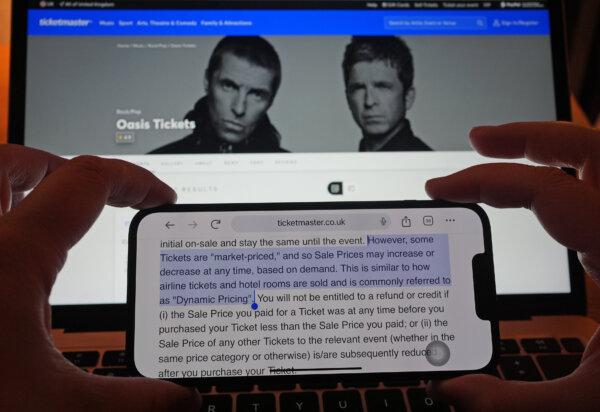A new cap on the price of resold tickets for concerts and other entertainment events will be introduced in a bid to clamp down on touts “fleecing the public,” the government announced.
The plans form part of a public consultation on measures to better protect fans and improve access to live events, launched on Friday by the Department for Business and Trade (DBT) and the Department for Culture, Media, and Sport (DCMS).
Some of the options being considered include capping the price of tickets being sold in the secondary market ranging from the original price up to 30 percent. Regulation could also limit the number of tickets that resellers can buy on the primary market and even sell on to consumers.
Other options being explored include creating new legal obligations to increase accountability of resale websites and reviewing existing legislation.
Culture Secretary Lisa Nandy said that “everyone deserves a fair shot” at getting tickets to see their favourite musicians or sports team live.
Nandy continued: “But for too long fans have had to endure the misery of touts hoovering up tickets for resale at vastly inflated prices.
6 Times Original Price
The proposals are supported by a number of consumer groups and music trade bodies.Fatboy Slim said it was “great to see money being put back into fans pockets instead of resellers.”
The musician and DJ said he was “fully behind this effort to make sure more people can enjoy incredible arts and music events across the country without being ripped off.”
According to the Competition and Market Authority (CMA), the typical markup of a resold ticket is more than 50 percent.
Dynamic Pricing
The DBT and DCMS also said that dynamic pricing in the primary market would be scrutinised, and is seeking views on whether the current system provides sufficient protection to fans from unfair practices.The departments said that consumers can get caught out by a lack of transparency over dynamic pricing, which is where prices are adjusted based on demand.

Rocio Concha, Which? director of policy and advocacy, said the recent Oasis ticket sales issues had “highlighted the flaws of so-called dynamic pricing in this market—with some customers queuing for hours for tickets only to find that prices had risen dramatically and were no longer affordable.”
Oasis Reunion
Nandy had pledged a review into dynamic pricing in September in response to the Oasis ticket price rises.At the time, the Advertising Standards Authority (ASA) said it had received over 1,000 complaints about Ticketmaster adverts, related to “misleading claims about availability and pricing.”
The ASA said it was not going to open an investigation, but would be supporting the CMA which launched a review on ticket marketing on Sept. 4.
The CMA said it was “urgently reviewing” the ticket market and would be working with ministers to ensure that current legislation was working to ensure consumers “get a fair deal when they buy tickets.”







